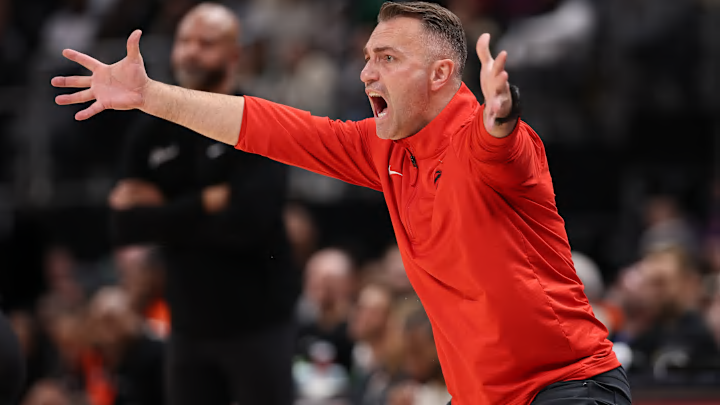The Toronto Raptors faced the Brooklyn Nets on December 19, showcasing their youngest starting lineup in franchise history, but the evening ended in disappointment.
Despite an encouraging start, the Raptors collapsed in the fourth quarter, marking their sixth consecutive loss, leaving fans wondering whether this is part of a strategy known as 'ethical tanking' or simply a symptom of poor execution on the court.
Is the Raptors' assumed 'ethical tank' taking an unethical turn?
Darko Rajakovic's coaching strategy—or lack thereof—was painfully apparent during the final moments against Brooklyn. The Raptors failed to run plays for franchise star Scottie Barnes, who chose ineffective screening actions over taking charge, disrupting their offensive flow.
With the game within reach, the execution faltered dramatically, revealing a concerning trend: teams can exploit the Raptors’ late-game vulnerabilities, leading to crushing defeats when they should have seized the moment.
This particular loss raised eyebrows not just because of the disappointing scoreline, but also due to the lingering notion of an 'ethical tank'. Nearly the entire Raptors roster has shown flashes of potential, but their continued inability to close out winnable games raises questions.
For some fans, the seemingly endless injury report has begun to look suspicious. RJ Barrett's late scratch for illness and Davion Mitchell's sudden shoulder strain only fanned the flames of discontent among the Raptors' faithful. A shark can smell blood in the water, and the Raptors' struggles in the fourth quarter have become increasingly damaging.
While moral victories can sometimes be derived from close losses, the Raptors’ late-game situation against Brooklyn felt increasingly grim. The missed shots and defensive lapses during crucial moments are detrimental to team morale.
Does the experience gained by their young roster outweigh the reality of lost games, especially against opponents they should be able to defeat?
In their last four offensive possessions against the Nets, Toronto went cold—missing a crucial corner three-pointer from Shead, a subsequent three from Barnes, and a blocked shot attempt from Dick. These critical moments, with the game tied, showcased a troubling pattern: a lack of direction and decisiveness.
While patience is often a virtue with young players, it's becoming clear that Toronto needs to develop a closer capable of navigating high-pressure moments—an ability that currently eludes this roster. The absence of a true clutch player to lead Toronto through intense late-game scenarios has been a persistent gap in the franchise since the glory days of Kawhi Leonard and the championship team.
Raptors suffer a disastrous fourth quarter lapse against Brooklyn Nets
Concern arises not just from the present but also from the coaching. Rajakovic has struggled to guide his players in critical situations, leading to questions about his long-term viability as head coach. The dynamic of a team that can win quarters but falter at the finish line is concerning. If they wish to turn the tide, Toronto will need to recalibrate its late-game strategy and, importantly, train its players to perform under pressure.
As fans express frustration, the concept of 'ethical tanking' might be losing its allure. Sure, the idea of developing young talent while maintaining draft positioning has merit, but consistent losses diminish team spirit and could erase the progress made with these younger players. True growth requires both development and winning—a balance that the Raptors are struggling to maintain.
Are these late-game disappointments a byproduct of youth and inexperience, or do they hint at a more profound organizational malaise?
While the promise of youth paints a hopeful future, the imperative to win games shouldn’t be downplayed. A win is more than just a number; it’s a building block for confidence, resilience, and that ever-elusive closing instinct that can change the narrative for this organization.
Only time will reveal whether the Raptors can harness their potential to secure victories rather than succumb to the shadows of ethical tanking speculation. The question looms large: can this team emerge from the chaos to forge a renewed path forward?
